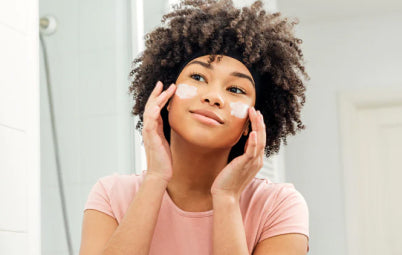Acne (also known as acne vulgaris) is one of the most common skin concerns in the UK, affecting 95% of people aged 11-30. That being said, we know statistics provide little consolation when it comes to curbing a sometimes debilitating skin condition.
Here at Face Dr, we understand that not all acne is made equal. Everyone’s skin is different – but whether you’re suffering from hormonal acne, acne rosacea or cystic acne you need to be on the lookout for active ingredients in all your skincare products. The main causes of acne are bacteria, excess oil production and dead skin cells, so you want ingredients that fight these pore-clogging culprits without stripping your skin.
Looking to skip the read and speak to an expert? You can book a free online skincare consultation with one of our skin experts now and get recommendations for products with active ingredients that will actually work by clicking the button below.
In this article, we list the best ingredients to help fight the symptoms of acne and ensure you maintain a healthy-looking complexion. No matter your budget, you’ll be able to find products which contain these ingredients all over the market at a range of different prices – from high street brands, to luxury skincare and all the way up to pharma-grade products.
Benzoyl peroxide

We’re diving in at the deep end here and getting one of the more controversial ingredients on this list out of the way first.
It’s fair to say that anything ‘peroxide’ related sounds pretty hardcore, but benzoyl peroxide is a common treatment for acne, so fear not. It’s a skin-safe antiseptic that helps rid your skin of any bacteria (a main cause of acne) sitting on your skin’s surface.
It’s available in a variety of strengths and sometimes mixed with other ingredients to improve its efficacy. ZO Skin Health Acne Control contains a carefully balanced combination of 10% benzoyl peroxide and a range of antioxidants to help clear pores, reduce redness and banish impurities.
You can expect to see results within four weeks with 5% benzoyl peroxide formulas and many acne sufferers swear by it as an effective form of acne treatment.
However, it can sometimes cause irritation, dryness and/or redness. It all depends on your skin, so keep an eye out for any side effects and reduce usage if they persist.
Centella Asiatica
Hydrated skin is healthy skin, and healthy skin stands a better chance of fighting off those acne-causing skin stressors.
Little known in the Western market, but very popular in Korean skincare products, this plant extract is a super-hydrating antioxidant. Using it in your routine means you’ll be fighting external aggressors like pollution and UV, which are extremely damaging to our skin and giving your face a much-needed hit of hydration.
If you want to reap the anti-oxidising benefits of this skin healer, try the Medik8 Bakuchiol Peptides. It helps smooth the appearance of fine lines and wrinkles while improving overall skin texture.

Zinc
This immunity-boosting mineral is one of the best acne spot treatments on the market. It helps our skin by bolstering the body’s ability to fight off bacteria, reducing the inflammatory response that causes acne.
Products containing zinc will also promote cell turnover which reduces the production of excess oil (also known as sebum) and prevents any buildup in your pores. ZO Sunscreen will do just that. Plus, SPF should be part of everyone’s skincare all year round, so this one comes with a (necessary) added bonus.

Niacinamide
When bacteria irritate our skin and excess sebum clogs our pores, our skin becomes inflamed, causing pimples, blemishes and unwanted pigmentation. To curb this, you need to incorporate an effective anti-inflammatory into your skincare routine.
Niacinamide (otherwise known as Vitamin B3) has powerful anti-inflammatory properties that will help calm your skin and soothe sores and imperfections. This wonder worker also helps to balance oil production, which can prevent future flare-ups.
ZO Skin Health Exfoliating Cleanser contains the perfect concentration to target surface sebum and break down that oiliness without leaving the skin feeling stripped and dry.

Acids
Once again, a scary-sounding ingredient, but rest assured, we know what we’re talking about. When it comes to alleviating acne, you need to be sure you’re exfoliating to get rid of any dirt and dead skin cells.
Abrasive scrubs have lost favour in recent years and been replaced with more gentle acidic exfoliants. When it comes to skincare, there are two main types of acids you want to look out for:
Alpa Hydroxy Acids (AHA): These water-soluble molecules are usually made from sugary fruits. They help break down the surface of your skin to promote smoothness and reveal a more even complexion.
Beta Hydroxy Acids (BHA): These work on a sub-surface level, penetrating deep into your pores to help break down excess oil and decongest your skin. If you’re looking to prevent whiteheads, this is what you want to use.
AHAs and BHAs are a non-abrasive way to banish blackheads, break down dead skin cells and reveal a bright and even complexion. The top three to look out for in your skincare products are:
-
Salicylic acid: This BHA is oil-soluble, which means it can cut through the skin’s sebum barrier and really get into your pores, thoroughly cleansing and detoxifying your skin from the inside out. This allows sebum to flow more freely from the pores, which, in turn, prevents future breakouts.
-
Lactic acid: If you’re looking to reduce the appearance of enlarged pores, this is the one for you. Lactic acid is an AHA that exfoliates to refine skin texture and reveal a brighter looking complexion.
-
Glycolic acid: A shining star in the world of skincare and a truly effective treatment for acne spots and scarring. This AHA dissolves the bonds which hold dead skin cells together, so it’s a great resurfacing agent. After a few weeks, your skin will appear brighter and smoother.
You’ll find all three of these acids in perfectly balanced concentrations in the ZO Oil Control Pads. Consistent use of this treatment will treat acne, reduce the appearance of hyperpigmentation and reveal smoother, softer skin.

Book a free consultation or order online with Face Dr
Ingredients you shouldn’t use if you suffer from acne

Having gone through all the ingredients, you should look out for its worth pointing out the ones you should steer clear of:
-
Natural oils: Pore-plugging oils such as coconut oil and jojoba oil will exacerbate symptoms of acne, causing whiteheads and breakouts. Make sure you’re using non-comedogenic ingredients – that’s skincare-speak for ‘doesn’t clog pores.’
-
Dehydrators: Avoid any harsh scrubs, sulfates and steer well clear of fragranced products. Remember, hydrated skin is healthy skin.
-
Aggressive ingredients: Although acne might look like it needs you to throw everything you’ve got at it, a gentle approach is best. Avoid skin-stripping retinoids at all costs.
-
Algae Extracts: Although these are great for rosacea flare-ups, they can clog pores, which will lead to more breakouts. If you suffer from acne rosacea, try incorporating vitamin C into your routine to calm the redness. But bear in mind this will cancel out the effects of niacinamide. If you want to use both, make sure to alternate between the two.
Want expert advice?

We hope this article has been a helpful resource in answering any questions you had about the best ingredients to use for acne. When purchasing products, keep this list in mind and remember to read the entire ingredients list before buying.
It’s worth bearing in mind that if you suffer from serious cystic acne, these ingredients may not be effective, and you might need to look into taking prescription acne medication. If this is the case, we can refer you to our GP & Clinical Director, Dr Julia Langford, who would be able to advise you further on this.
Here at Face Dr, we offer a range of medical-grade skincare and consultations with skincare professionals to help alleviate your concerns and diagnose any issues you might be having. If you’d like to find out more about the products and services we offer, click here.











